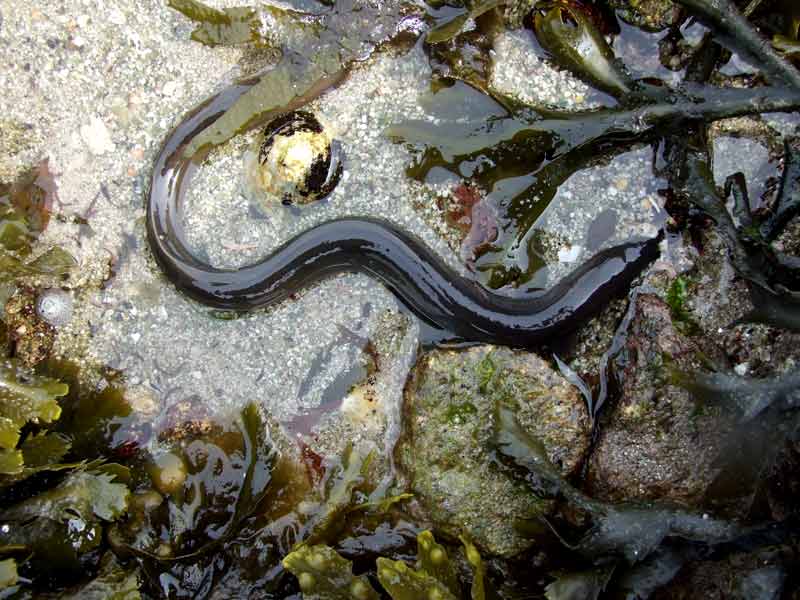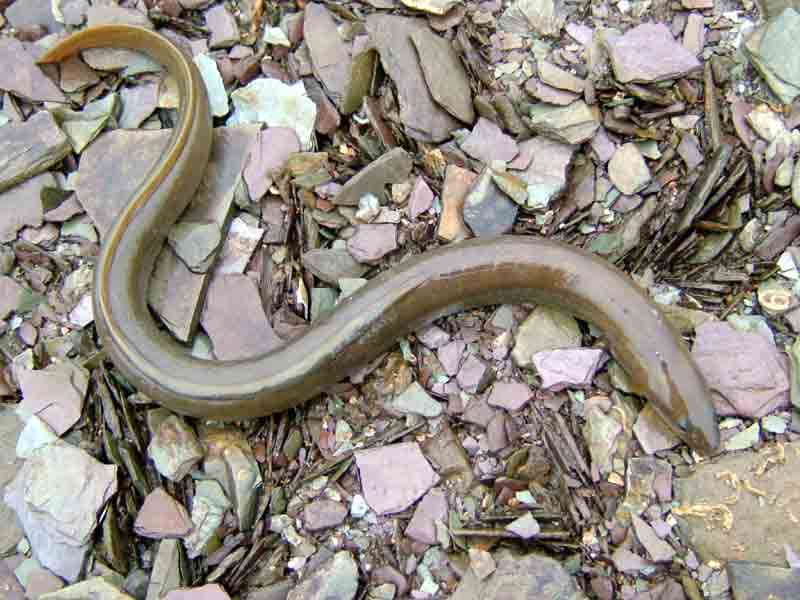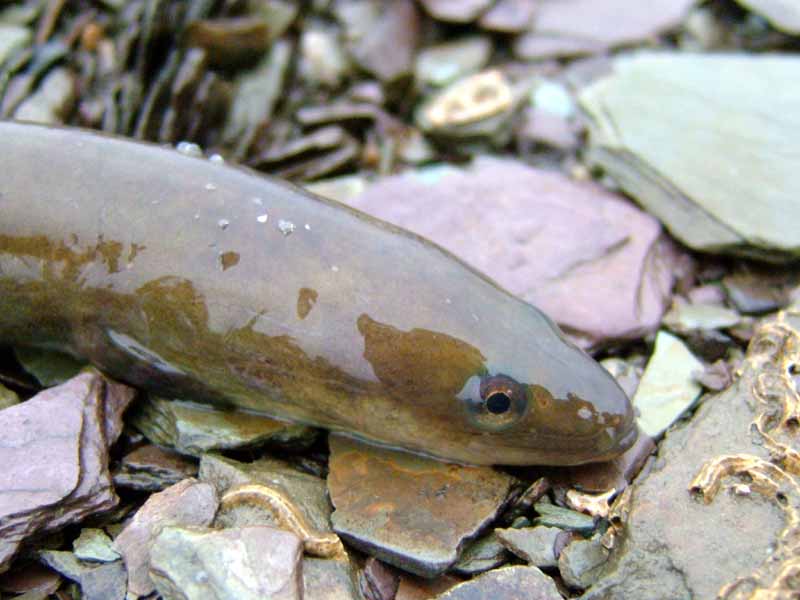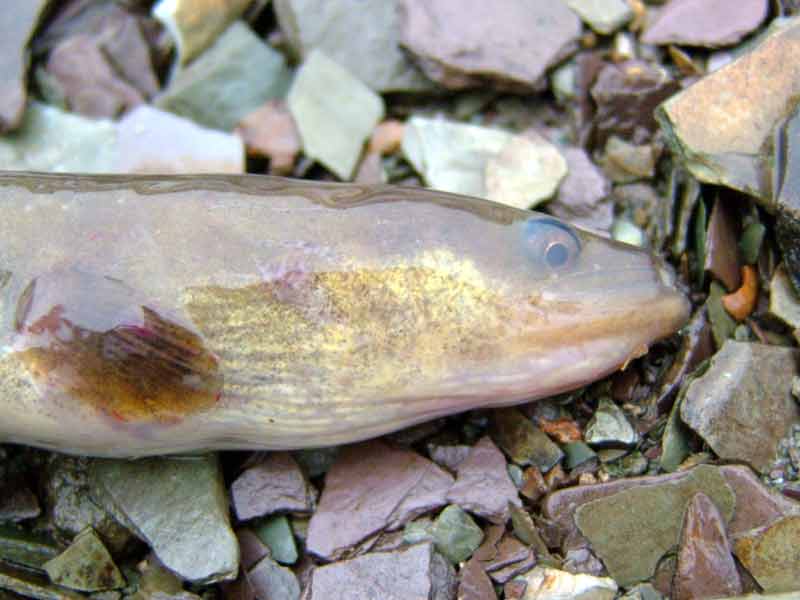Common eel (Anguilla anguilla)
Distribution data supplied by the Ocean Biodiversity Information System (OBIS). To interrogate UK data visit the NBN Atlas.Map Help
| Researched by | Penny Avant | Refereed by | Admin |
| Authority | (Linnaeus, 1758) | ||
| Other common names | - | Synonyms | - |
Summary
Description
Recorded distribution in Britain and Ireland
Widely distributed around the British and Irish coast.Global distribution
Common in rivers, estuaries around the coast of northern Europe.Habitat
The adult eel is most abundant in estuaries and low salinity pools but is also found around the coast in permanent tide pools, on the lower shore and shallow sublittoral. Being nocturnal it is inactive during the day under rocks or weed or in soft sediments.Depth range
-Identifying features
- Slender snake-like body usually less than 1m long.
- The dorsal and ventral fins arise well behind the gill slits and pectoral fins.
- They are continuous and meet in a point at the tail.
- The lower jaw protrudes slightly from the upper jaw.
- Small, round eyes.
- Colour usually dark brown, black or olive green on the back, lighter and yellowish on the underside.
- Slimy skin with tiny scales embedded in it.
Additional information
Anguilla anguilla has a complex life history that is poorly understood. It involves migration of mature adults from European rivers and estuaries to the Sargasso Sea in the west Atlantic for spawning, and the subsequent return of juveniles. They metamorphose twice, part of the life cycle spent in freshwater and part in estuarine or full sea water (Whitehead et al., 1986). The adult eels and the returning juveniles (elvers) are commercially fished. The common eel has small eyes and its lower jaw projects from the upper, which distinguishes it from the conger eel, Conger conger. In the common eel the dorsal fin arises about a head's length behind the gill slits and pectoral fins while in the conger eel the fin arises further forward, from just behind the pectoral fins.Listed by
Bibliography
Froese, R. & Pauly, D., 2004. Fishbase. A global information system on fishes. [On-line] http://www.fishbase.org, 2004-10-18
Hayward, P., Nelson-Smith, T. & Shields, C. 1996. Collins pocket guide. Sea shore of Britain and northern Europe. London: HarperCollins.
Howson, C.M. & Picton, B.E., 1997. The species directory of the marine fauna and flora of the British Isles and surrounding seas. Belfast: Ulster Museum. [Ulster Museum publication, no. 276.]
Muus, B.J. & Dahlstrom, P., 1974. Collins guide to the sea fishes of Britain and North-Western Europe. Wm Collins Sons & Co. Ltd: London.
Wheeler, A., 1969. The fishes of the British Isles and north-west Europe. London: Macmillan.
Wheeler, A., 1994. Field Key to the Shore Fishes of the British Isles. Shrewsbury: Field Studies Council.
Whitehead, P.J.P., Bauchot, M.-L., Hureau, J.-C., Nielson, J. & Tortonese, E. 1986. Fishes of the North-eastern Atlantic and the Mediterranean. Vol. I, II & III. Paris: United Nations Educational, Scientific and Cultural Organisation (UNESCO).
Datasets
Bristol Regional Environmental Records Centre, 2017. BRERC species records recorded over 15 years ago. Occurrence dataset: https://doi.org/10.15468/h1ln5p accessed via GBIF.org on 2018-09-25.
Bristol Regional Environmental Records Centre, 2017. BRERC species records within last 15 years. Occurrence dataset: https://doi.org/10.15468/vntgox accessed via GBIF.org on 2018-09-25.
Cambridgeshire & Peterborough Environmental Records Centre, 2017. CPERC Combined Dataset. Occurrence dataset: https://doi.org/10.15468/npthhv accessed via GBIF.org on 2018-09-25.
Centre for Environmental Data and Recording, 2018. Ulster Museum Marine Surveys of Northern Ireland Coastal Waters. Occurrence dataset https://www.nmni.com/CEDaR/CEDaR-Centre-for-Environmental-Data-and-Recording.aspx accessed via NBNAtlas.org on 2018-09-25.
Cofnod – North Wales Environmental Information Service, 2018. Miscellaneous records held on the Cofnod database. Occurrence dataset: https://doi.org/10.15468/hcgqsi accessed via GBIF.org on 2018-09-25.
Dorset Environmental Records Centre, 2017. Dorset SSSI Species Records 1952 - 2004 (Natural England). Occurrence dataset: https://doi.org/10.15468/vcjzts accessed via GBIF.org on 2018-09-25.
Environmental Records Information Centre North East, 2018. ERIC NE Combined dataset to 2017. Occurrence dataset: http://www.ericnortheast.org.ukl accessed via NBNAtlas.org on 2018-09-38
Fenwick, 2018. Aphotomarine. Occurrence dataset http://www.aphotomarine.com/index.html Accessed via NBNAtlas.org on 2018-10-01
Fife Nature Records Centre, 2018. Fife Nature Records Centre combined dataset. Occurrence dataset: https://doi.org/10.15468/ccc1ip accessed via GBIF.org on 2018-09-27.
Fife Nature Records Centre, 2018. St Andrews BioBlitz 2014. Occurrence dataset: https://doi.org/10.15468/erweal accessed via GBIF.org on 2018-09-27.
Greater Manchester Ecology Unit, 2018. Distribution of Species of Conservation Interest in Greater Manchester. Occurrence dataset: https://www.tameside.gov.uk/ecologyunit accessed via NBNAtlas.org on 2018-09-27.
Isle of Wight Local Records Centre, 2017. IOW Natural History & Archaeological Society Marine Records. Occurrence dataset: https://doi.org/10.15468/7axhcw accessed via GBIF.org on 2018-09-27.
Isle of Wight Local Records Centre, 2017. Isle of Wight Notable Species. Occurrence dataset: https://doi.org/10.15468/sm4ety accessed via GBIF.org on 2018-09-27.
Kent & Medway Biological Records Centre, 2017. Fish: Records for Kent. Occurrence dataset https://doi.org/10.15468/kd1utk accessed via GBIF.org on 2018-09-27.
Kent Wildlife Trust, 2018. Kent Wildlife Trust Shoresearch Intertidal Survey 2004 onwards. Occurrence dataset: https://www.kentwildlifetrust.org.uk/ accessed via NBNAtlas.org on 2018-10-01.
Lancashire Environment Record Network, 2018. LERN Records. Occurrence dataset: https://doi.org/10.15468/esxc9a accessed via GBIF.org on 2018-10-01.
Leicestershire and Rutland Environmental Records Centre, 2017. Leicestershire and Rutland Fish. Occurrence dataset: https://doi.org/10.15468/blsyfz accessed via GBIF.org on 2018-10-01.
Leicestershire and Rutland Environmental Records Centre, 2017. Leicestershire and Rutland Protected and Conservation Priority/BAP Specie. Occurrence dataset: https://doi.org/10.15468/7ve2nt accessed via GBIF.org on 2018-10-01.
Manx Biological Recording Partnership, 2017. Isle of Man wildlife records from 01/01/2000 to 13/02/2017. Occurrence dataset: https://doi.org/10.15468/mopwow accessed via GBIF.org on 2018-10-01.
Manx Biological Recording Partnership, 2022. Isle of Man historical wildlife records 1990 to 1994. Occurrence dataset:https://doi.org/10.15468/aru16v accessed via GBIF.org on 2024-09-27.
Merseyside BioBank., 2018. Merseyside BioBank (unverified). Occurrence dataset: https://doi.org/10.15468/iou2ld accessed via GBIF.org on 2018-10-01.
National Trust, 2017. National Trust Species Records. Occurrence dataset: https://doi.org/10.15468/opc6g1 accessed via GBIF.org on 2018-10-01.
National Trust, 2017. Wicken Fen nature reserve species data held by The National Trust. Occurrence dataset: https://doi.org/10.15468/iqeemg accessed via GBIF.org on 2018-10-01.
National Trust, 2018. Anglesey Abbey wildlife species data held by The National Trust. Occurrence dataset: https://doi.org/10.15468/mjs49u accessed via GBIF.org on 2018-10-01.
National Trust, 2018. Wimpole Estate species data held by The National Trust. Occurrence dataset: https://doi.org/10.15468/l8oy9m accessed via GBIF.org on 2018-10-01.
NBN (National Biodiversity Network) Atlas. Available from: https://www.nbnatlas.org.
Norfolk Biodiversity Information Service, 2017. NBIS Records to December 2016. Occurrence dataset: https://doi.org/10.15468/jca5lo accessed via GBIF.org on 2018-10-01.
North East Scotland Biological Records Centre, 2017. NE Scotland fish records 1800-2010. Occurrence dataset: https://doi.org/10.15468/kjrwnd accessed via GBIF.org on 2018-10-01.
OBIS (Ocean Biodiversity Information System), 2025. Global map of species distribution using gridded data. Available from: Ocean Biogeographic Information System. www.iobis.org. Accessed: 2025-08-15
Outer Hebrides Biological Recording, 2018. Vertebrates (except birds, INNS and restricted records), Outer Hebrides. Occurrence dataset: https://doi.org/10.15468/dax3tf accessed via GBIF.org on 2018-10-01.
Record, 2018. RECORD Freshwater Fish Data. Occurrence dataset https://doi.org/10.15468/m5tosv accessed via GBIF.org on 2018-10-01
Rotherham Biological Records Centre, 2017. Rotherham Biological Records Centre - Non-sensitive Records from all taxonomic groups. Occurrence dataset: https://doi.org/10.15468/d3tufo accessed via GBIF.org on 2018-10-02.
South East Wales Biodiversity Records Centre, 2018. SEWBReC Fish (South East Wales). Occurrence dataset: https://doi.org/10.15468/htsfiy accessed via GBIF.org on 2018-10-02.
South East Wales Biodiversity Records Centre, 2018. Dr Mary Gillham Archive Project. Occurance dataset: http://www.sewbrec.org.uk/ accessed via NBNAtlas.org on 2018-10-02
Staffordshire Ecological Record, 2017. Data from Defra Family Organisations supplied to Staffordshire Ecological Record. Occurrence dataset: https://doi.org/10.15468/giebpp accessed via GBIF.org on 2018-10-02
Staffordshire Ecological Record, 2017. SER Species-based Surveys. Occurrence dataset: https://doi.org/10.15468/q8qen3 accessed via GBIF.org on 2018-10-02.
Suffolk Biodiversity Information Service., 2017. Suffolk Biodiversity Information Service (SBIS) Dataset. Occurrence dataset: https://doi.org/10.15468/ab4vwo accessed via GBIF.org on 2018-10-02.
The Wildlife Information Centre, 2017. LWIC - Local Patch Project. Occurrence dataset http://www.wildlifeinformation.co.uk/. Accessed via NBNAtlas.org/ on 2018-10-02.
The Wildlife Information Centre, 2017. The Wildlife Information Centre - BioBlitz Events. Occurrence dataset: https://doi.org/10.15468/1iynpe accessed via GBIF.org on 2018-10-02.
The Wildlife Information Centre, 2018. Borders Backyard Biodiversity. Occurrence dataset: https://doi.org/10.15468/jfymio accessed via GBIF.org on 2018-10-02.
West Wales Biodiversity Information Centre, 2017. WTSWW Data: All Taxa (West Wales). Occurrence dataset: https://doi.org/10.15468/gaakk2 accessed via GBIF.org on 2018-10-02.
Yorkshire Wildlife Trust, 2018. Yorkshire Wildlife Trust - Non-sensitive records from all taxonomic groups. Occurrence dataset: https://doi.org/10.15468/2razk5 accessed via GBIF.org on 2018-10-02.
Yorkshire Wildlife Trust, 2018. Yorkshire Wildlife Trust Shoresearch. Occurrence dataset: https://doi.org/10.15468/1nw3ch accessed via GBIF.org on 2018-10-02.
Citation
This review can be cited as:
Last Updated: 03/09/2007






